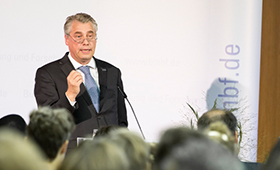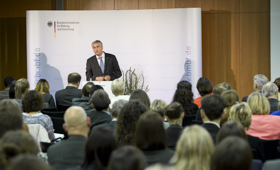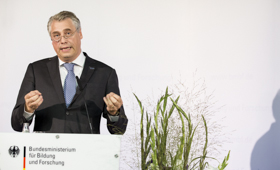The recognition of professional and vocational qualifications is a success story
The monitoring results presented by Prof. Dr. Friedrich Hubert Esser, President of the Federal Institute for Vocational Education and Training (BIBB), at a conference staged in Berlin by the Federal Ministry of Education and Research show that the “Law to improve the assessment and recognition of professional and vocational education and training qualifications acquired abroad”, which was passed by the Federal Government in 2012, has been a success. Yet challenges remain.

In its capacity as lead specialist and information agency, BIBB is closely involved with the implementation of the Recognition Act. “Our Monitoring Project clearly draws a positive and multi-layered picture of current practice,” stressed Professor Esser. “The opportunities offered by recognition are being utilised, and even partial recognition means transparency and benefits on the labour market.” Professor Esser pointed out that there had been 26,500 applications during the first two years that the law had been in force. More than 16,500 persons had received certification that their professional or vocational qualification was fully equivalent to the German reference occupation. Over the past three years, it had proved possible to accord either full or partial recognition in 96 percent of cases where a decision was reached. Although almost a quarter of applications (22 percent) related to non-regulated technical and commercial private sector occupations or to recognised training occupations in the craft trades, the three reference occupations most in demand were all regulated professions. These are doctor, registered general nurse and physiotherapist.
Professor Esser also underlined that interest in seeking advice was rising and that the guidance infrastructure was good. The increasing demand was being reflected on the “Recognition in Germany” portal, which is housed at BIBB, and in the amount of face-to-face guidance being provided prior to, during and after the procedure. “Awareness of the act is growing all the time.” The advisory provision offered by the Federal Government, such as the hotline operated by the Federal Office for Migration and Refugees and the advisory bodies of the “Integration through Training” (IQ) funding programme and of the chambers of industry and commerce and chambers of crafts and trades are effective, highly popular and well established. The good guidance on offer had also meant that, in the case of the non-regulated occupations, the proportion of procedures resulting in a negative notice had fallen from 24.9 percent in 2012 to 4.4 percent in 2013.
"It is important to continue to monitor the development of recognition of qualifications acquired abroad."
(Prof. Dr. Esser)
Making skills analysis an established part of practice

Professor Esser went on to say that the BIBB Monitoring Project also showed that use was being made of the possibility enshrined in the Recognition Act to take different types of learning outcomes into account. With regard to informal learning, it had become clear that occupational experience played a major role in the case of non-regulated occupations. The latest figures revealed that it had been used to compensate for substantial differences in about four in ten (42.1 percent) of completed procedures. In nearly all cases, consideration of occupational experience had resulted in recognition of full equivalence.
By way of contrast, professional experience is significantly less likely to be taken into consideration in the regulated sector. It was used as part of the equivalence assessment procedure in around one in ten (9.7 percent) cases in which a decision was reached. A similar picture was revealed with regard to the notices issued. Full equivalence without a compensation measure was identified in three quarters of procedures in which consideration was accorded to professional experience.
How are different learning outcomes acknowledged? “A competence assessment, the so-called skills analysis, is possible if someone is unable to present documentation through no fault of their own, a situation which refugees often find themselves in,” said Professor Esser. However, very little use of this opportunity had been made thus far. About 60 skills analyses had been conducted in 2013. Of these, 27 had resulted in full equivalence and 24 in partial equivalence. No recognition was awarded on nine occasions.
In the second part of his presentation, Professor Esser addressed the challenges that remained in terms of implementing the Recognition Act despite the success achieved hitherto. Firstly, there needed to be an improvement in the recognition process in cases where documentation was absent. This issue was being precisely targeted by the BIBB-coordinated “Prototyping Transfer” project with the aim of making the skills analysis an established part of practice. Secondly, recognition of competences acquired by informal and non-formal means needed to be expanded. “This is an area in which we must strengthen validation,” explained Professor Esser. “Such an approach is consistent with the objective of lifelong learning.” Experiences gained with the validation of learning outcomes pursuant to the Professional Qualifications Assessment Act BQFG could be used within a new legal framework that also includes German residents who have gone through the domestic educational system without achieving a formal qualification.
Professor Esser also urged an extension of continuing training provision and the removal of barriers to entry. The Recognition Act offered opportunities for development because continuing training courses were taken into account in the application process to compensate for substantial differences following identification of “partial equivalence”. It was also significant that training needs could be derived from the notices. “There must be enough vocational and academic continuing training provision in place, and this provision needs to be individually tailored to the objectives of those seeking recognition,” Professor Esser added. Neither should barriers to entry such as inconvenient course times or long distances to travel be permitted to stand in the way of continuing training wishes. “And provision needs to be customer oriented!”
Financing of the recognition procedures

Professor Esser stated that financial hurdles along the route to recognition constituted the fourth challenge. “We need to remove these hurdles,” he demanded. Assumption of the costs of the recognition procedure by the Job Centres depended on the expected success of the recognition and subsequent labour market integration. “Unfortunately, cost is still a reason not to submit an application.” Since 2015, the special funds provided within the scope of the “Prototyping Transfer” project had been supporting applications in the implementation of skills analyses. “Nevertheless, there is still a need for the stakeholders involved to identify further financing routes.”
Apart from this, companies needed to be offered support in seizing the chances offered by recognition. The company survey carried out by BIBB in 2014 as part of the Monitoring Project showed that companies were aware of the presence of persons seeking recognition without having a particular focus on the issue. Almost 80 percent of companies had no reservations about employing persons with a foreign professional or vocational qualification. 20 percent were concerned that the qualification was not comparable to the German qualification despite recognition or that language knowledge was insufficient.
It had also emerged that two thirds of companies are prepared to assist staff with a recognition procedure. Many companies which have recruited persons with foreign professional or vocational qualifications mention the competences they bring in terms of intercultural skills and country knowledge. They also point out that not only migrants need to be “employment ready” if the requirements of trade and industry are to be met. Companies should also open up to a greater extent and, if necessary, offer something special (such as language courses) in order to acquire skilled workers.
Concluding his remarks, Professor Esser stated that the positive results of the Monitoring Project and the upcoming challenges clearly meant: “It is important to continue to monitor the development of recognition of qualifications acquired abroad, in a systematic way and on an empirical and long-term basis.”